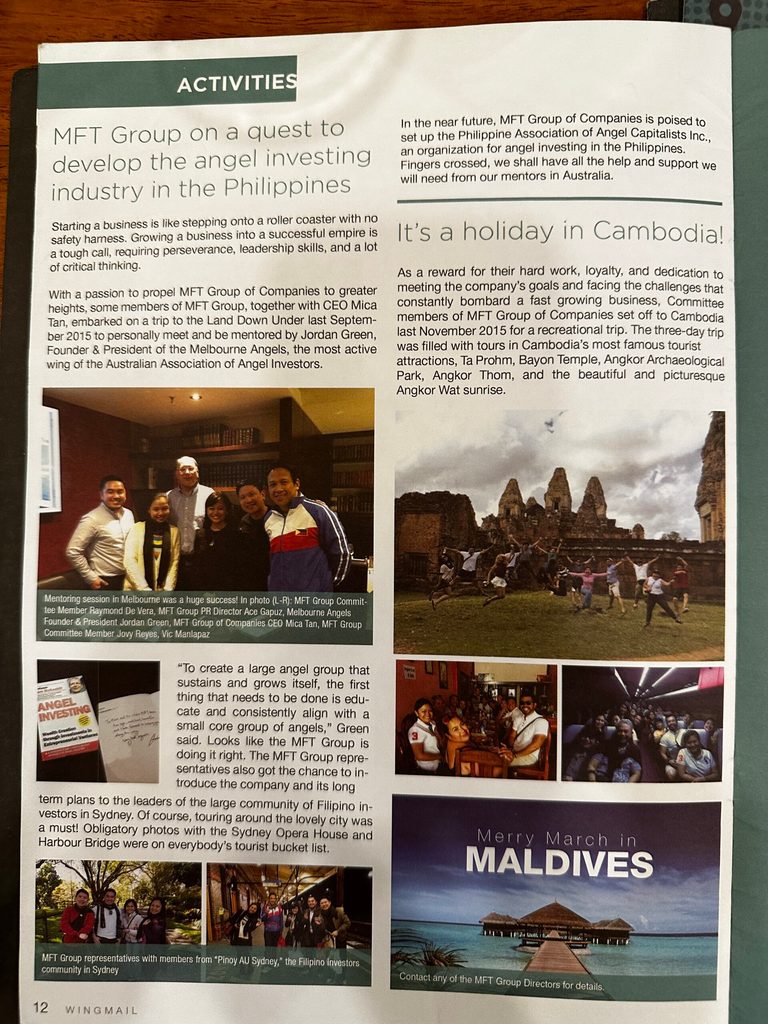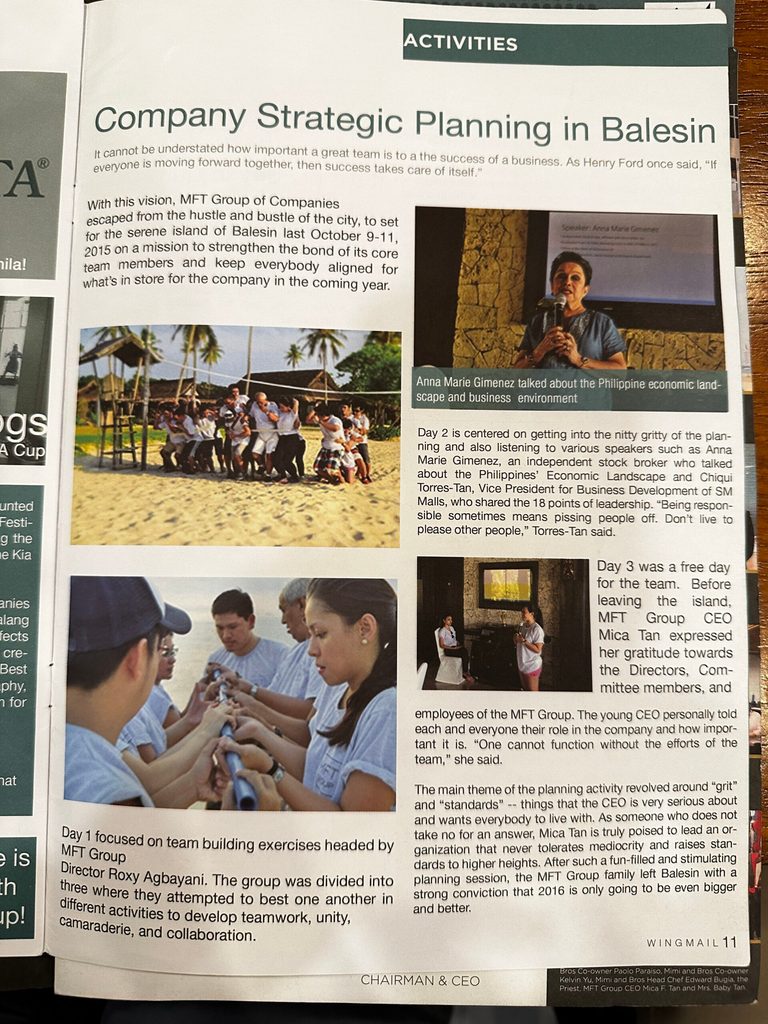SUMMARY
This is AI generated summarization, which may have errors. For context, always refer to the full article.

Millennial CEO Maria Franchesca “Mica” Tan may have had her finest year ever in 2017.
When her peers were still climbing up the corporate ladder, Tan, who was 27 at the time, was already busy buying stakes in companies and appearing on TV shows.
The private equity firm she founded in 2014, the MFT Group of Companies, was at its peak, growing in healthcare, food, and financial services.
2017 was also the year when the media started to pick up her incredible story: At just 13 years old, she was already busy investing in the stock market. At 15, she was already into foreign exchange.
In several interviews, Tan attributed her drive for business to her mother, who has a jewelry business. She would sell little treats at the hospital where her father, an oncologist, would do his rounds.
With her background in business, she was one of the featured mentors of the Shark Tank-like show called “The Final Pitch,” which aired in 2017 on the History Channel and the now defunct CNN Philippines. This stint catapulted her to the spotlight.
Her inspiring entrepreneurial spirit and ability to bridge young and old minds captured the attention of several shows and publications, including Bloomberg, BusinessWorld, Tatler, and even Rappler.
“I don’t latch on if you’re a baby boomer or a Gen X or a millennial. I think what has helped me work with teams with a lot more senior people is what they call intellectual humility. I think that humility is the cornerstone of leadership, and that’s something that regardless of age, I think, we should bring that with us,” Tan said in a Business Sense episode in 2021.
Tan had a stellar public image and compelling narrative, earning praises from the business community.
In 2022, she would even be nominated as EY entrepreneur of the year by the SGV Foundation.
But her nomination for the award would then be questioned* after several investors sounded the alarm over bounced checks. Some wrote a letter to SGV, urging them to remove Tan from the list of nominees. (*Editor’s note: An earlier version of this story said that Tan’s nomination for the 2022 EY entrepreneur of the year award was rescinded. This has been corrected as Tan’s name still appears on the list of finalists notwithstanding appeals to remove it.)
“Celebrating a successful entrepreneur with questionable integrity sends the wrong message to people as instead of rewarding a can-do spirit that is sustainable and beneficial to more than just the entrepreneur themselves, we instead reward unadulterated greed and questionable practices,” part of the letter to SGV Foundation read.
Tan’s name still appears on the list of 2022 entrepreneur of the year nominees uploaded on EY’s website.
By 2023, several investors filed complaints against Tan, triggering a bitter spat.
On Monday, April 22, 2024, the Securities and Exchange Commission (SEC) brought the MFT Group and Tan’s and Foundry Ventures before the Department of Justice (DOJ) for criminal prosecution over their alleged illegal investment taking activities. Also implicated in the complaint was Isla Lipana & Co., which served as the independent auditor.
Tan’s MFT Group insisted they are a legitimate business. But for the SEC, the business had all the elements of a Ponzi scheme.
Tan’s business model
According to several minority investors of the MFT Group, Tan’s business revolved mostly on purchase order (PO) financing for different companies under their portfolio.
Tan would encourage people, mostly friends and acquaintances, to loan her money to invest in companies. Investors would then be guaranteed that after at least a year, with a maximum of five years, their money will grow and earn monthly interest.
The MFT Group guaranteed returns on investment between 12% and 18% of the initial investment. To maintain the program, interested investors were given a promissory note or a borrower-lender agreement as evidence of their investment, and post-dated checks with 1% to 1.5% monthly interest were issued to them.
Multiple sources Rappler spoke with said the minimum investment ranged between P1 million to P5 million, though others were eventually allowed to invest P100,000.
“This is not for ordinary Filipinos, since the amount is quite high. You need to have money to be in,” one source said.
Another individual, who requested anonymity, said he sank a total of P14 million into MFT. The source was encouraged to invest, as Tan paid on time and signed the checks herself, up until 2022 when payments started to get delayed.
Apart from monthly interest, Tan also incentivized investors and associates with travel perks. Should associates entice enough people to cumulatively invest P30 million, they would be able to fly to Balesin Island and other luxury destinations.
Rappler was able to see portions of the MFT Group’s newsletter showing that its employees did enjoy the amenities of Balesin Island. The newsletter also mentioned that staff were able to fly to Cambodia. It also teased about a trip to the Maldives.


Other sources claimed that some investors and associates were able to fly to Iceland, as well as New Zealand and Australia, as long as people were willing to put in new money. Rappler, however, could not independently verify this, as these activities were not mentioned in the newsletters.
MFT’s newsletter given to prospective investors highlighted some of the other endeavors of the company, including funding for the NU Bulldogs. The company also supposedly bankrolled a film called Nilalang, which starred Cesar Montano and Maria Ozawa. It competed in the 2015 Metro Manila Film Festival.

Rappler was able to see portions of the complaint lodged by some investors, noting that they were promised commissions every time they were able to recruit new investors.
Red flags
These complaints were brought to the SEC once checks started to bounce.
The SEC noted that the business model of the MFT Group and Foundry Ventures, another company of Tan, was basically a Ponzi scheme, “since their success and viability are anchored on the additional investments of existing investors and/or the investments of new investors.” The Commission noted that the nature of the promissory notes were “clearly investment contracts.”
The SEC issued a cease and desist order against the MFT Group and Foundry Ventures in January, where the officers and directors of the companies were directed to stop their investment solicitation activities without the necessary licenses from the SEC. The order was made permanent on April 1.
Some 30 of the MFT Group’s officers were found by the SEC to be accountable for 17 charges of misrepresentation* in their audited financial statements from 2018 to 2021, since they had reported dividend income that had no basis. (*Editor’s note: A previous version of the story said officers were found to be liable for falsification. This has been tweaked for accuracy.)
“The SEC noted that the amount received by the MFT Group from its investors should have been recognized in its books of accounts either as part of the company’s liabilities (creditor’s equity) or share capital (stockholder’s equity). This is consistent with the accounting equation that any increase in the asset of an entity must have a corresponding increase in the company’s liabilities or capital or both,” the SEC said.
“Based on the financial review conducted, no such amount reflected in the [audited financial statement] of the subject company would correspond to the monies invested by the investors to either equity or liabilities of the company. This clearly indicates that the monies received through the representations of the MFT Group of Companies were not recognized in the company’s books.”
The SEC’s strongly-worded statement went on to say that MFT’s auditor, Isla Lipana, colluded with the company in its fraudulent activities by making it appear that the financial statements of the company were fairly presented despite inconsistencies and inaccuracies in the audited financial statements.
“Considering that this discrepancy happened over the years, and given its significant impact on the financial position of the MFT Group, the same cannot be considered an isolated event. The fact that respondent auditors repeatedly engaged themselves in this kind of irregularity is a clear indication of its intention to conceal the actual financial status of the MFT Group, to the prejudice of its investors,” the SEC said.
In a statement, Isla Lipana said the MFT Group is their only audit client. The subsidiary, The Foundry, was not audited by the company. Isla Lipana went on to clarify that they have yet to issue their reports for 2022 and 2023 pending completion of audit procedures.
“We are committed to fully cooperate with an ongoing investigation by the Department of Justice,” Isla Lipana said.
MFT’s response
In a statement on Monday, April 22, MFT Group stood firm that it did not engage in securities transactions, and nor did it violate the Revised Securities Act.
“We welcome the opportunity to clear our names and are hopeful that the DOJ will exonerate us. From the beginning, we were never shown a copy of the alleged complaints and it is only now that the SEC produced the alleged complaints for the DOJ,” the MFT Group and The Foundry said in a joint statement.
Prior to the SEC’s complaints, shareholders of the MFT Group and The Foundry insisted that transactions were “straightforward private loans between individuals and not securities.”
The companies are also committed to a five-year loan recovery program, with adjusted interest rates. They attributed the delayed payments to the pandemic’s economic impact.
“Honoring their loan obligations has been the foundation of the long-standing private transactions by the shareholders with their creditors. It is unfortunate that their spotless track record of timely payments was tarnished by the pandemic – something that is not isolated to this case but largely experienced by individuals and businesses alike, here and everywhere,” said Rey Villegas, a lawyer and private creditor of one of the shareholders of The Foundry.

In a press release, the MFT Group and The Foundry said that Villegas has agreed to the five-year loan restructuring program.
“He is one of the cooperative creditors who place confidence in the ability of MFT Group to bounce back and recover, which will ultimately lead to creditors getting paid,” the release said.
The SEC did not disclose just how much Tan’s companies owed investors, describing only how the MFT Group and The Foundry operated in a Ponzi-like scheme.
One investor who wished to remain anonymous told Rappler that he is no longer expecting Tan or the companies to return his P10 million.
“I’m okay, I am financially secure. But I feel sad for those who gave the smaller amounts, those who sold property or borrowed just to give P100,000. They are the ones who are truly suffering. I hope that Mica will prioritize them,” the source said. – Rappler.com
Add a comment
How does this make you feel?







There are no comments yet. Add your comment to start the conversation.